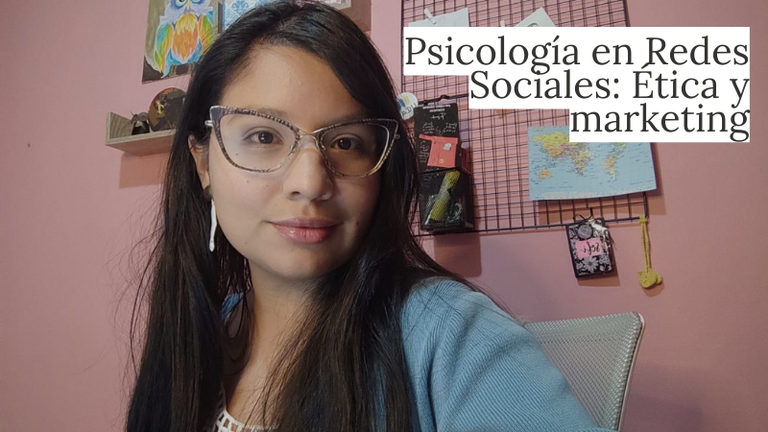El rol del psicólogo que también es Creador de Contenido [ESP-ENG]

Cada vez son más visibles los temas relacionados a la salud mental y esto, por un lado, suple vacíos y disminuye los estigmas, al mismo tiempo que trae consigo algunos desafíos.
Las redes sociales son la principal fuente de información y acceso a servicios para los jóvenes de la actualidad. Los psicólogos, y en general, otros profesionales del área de la salud promocionan sus servicios a través de dichas plataformas.
Esta es un área a la que me he acercado recientemente y he visto dos caminos que suelen tomar los profesionales creadores de contenido:
1.- Masificación de la información y alcance a millones a usuarios, con el precio de simplificar los temas compartidos y crear títulos atractivos, virales, aunque no siempre acertados.
2.- Mantenimiento de la seriedad del rol profesional, sin manifestar mayor interés en llegar a miles de personas, aunque eso implique limitar los potenciales clientes/pacientes.
Los que nos dedicamos a la psicología y ofrecemos el servicio de terapia psicológica podemos llegar a tener un conflicto interno entre estos dos caminos. Nos apasiona lo que hacemos, entendemos la grandísima responsabilidad que implica nuestro trabajo pero también sabemos que debemos "vendernos", promocionarnos. Un psicólogo que no se vende a sí mismo lamentablemente no podrá vivir de su profesión, y eso, insisto, es realmente lamentable, sobre todo para aquellos psicólogos comprometidos, preparados, y formados profesionalmente con las herramientas para ayudar a otros, que por sobre todas las cosas aman lo que hacen.
La pregunta es, ¿Cómo promocionarnos y vender nuestro trabajo en redes sociales sin poner en riesgo nuestra ética profesional?
Me he dado una respuesta a mi misma. He querido llegar a un punto medio entre los dos caminos que mencioné anteriormente, y si ese punto medio no existiese, me inclino más por la ética y la responsabilidad que implica mi profesión. Esto no se trata de viralización, fama o dinero, esto se trata de seres humanos que se encuentran en sufrimiento, ese es uno de los aspectos que más respeto de mi profesión.
El fin de semana justamente leí un artículo del número abril/mayo 2024 de la American Psychological Association sobre este tema, rescato de allí tres aspectos que me parecieron sumamente relevantes:
1.- Los psicólogos deben considerar el impacto de cualquier mensaje que comparten en sus redes sociales, incluídos la audiciencia y los pacientes que puedan recibir ese mensaje.
2.- Conversar sobre las redes sociales con cada paciente que llega a consulta: los límites de estas, y que no son espacios terapéuticos, ni siquiera para los propios pacientes.
3.- Discutir sobre los temas de confidencialidad con los pacientes, explicando que nunca se compartirá información sobre la consulta a menos que el paciente explícitamente otorgue el permiso para ello.
La psicoeducación, el humor, el compartir conocimientos y estrategias pueden coexistir en las redes sociales del psicólogo sin que eso implique sacrificar los límites propios de la profesión, tener comportamientos poco éticos o poner en riesgo a la audiciencia que consume el contenido. Para el psicólogo que también es creador de contenido es importante la autorevisión constante, el apoyo y la supervisión de otros colegas, tener presente los códigos de ética y actuar desde el sentido moral y ético que se nos enseña en nuestra profesión. Si en algún momento dudamos de la veracidad o el sentido de algún contenido, es preferible que lo descartemos por completo y nos centremos en aquello que es útil y comprensible para los que confían en seguirnos y consumen nuestro contenido.
Continuemos aprendiendo!
Artículo de la APA disponible en: https://www.apa.org/monitor/2024/2024-04-monitor.pdf


Mental health issues are becoming more and more visible and this, on the one hand, fills gaps and decreases stigmas, while at the same time bringing with it some challenges.
Social networks are the main source of information and access to services for young people today. Psychologists, and in general, other health care professionals promote their services through such platforms.
This is an area that I have approached recently and I have seen two paths that content-creating professionals tend to take:
1.- Massification of information and reach to millions to users, with the price of simplifying the topics shared and creating attractive, viral titles, although not always successful.
2.- Maintaining the seriousness of the professional role, without showing greater interest in reaching thousands of people, even if that means limiting the potential clients/patients.
Those of us who dedicate ourselves to psychology and offer psychological therapy services may have an internal conflict between these two paths. We are passionate about what we do, we understand the great responsibility that our work implies, but we also know that we must "sell ourselves", promote ourselves. A psychologist who does not sell himself will unfortunately not be able to make a living from his profession, and that, I insist, is really unfortunate, especially for those psychologists who are committed, prepared, and professionally trained with the tools to help others, and who above all love what they do.
The question is, how do we promote ourselves and sell our work on social networks without putting our professional ethics at risk?
I have given myself an answer. I have wanted to reach a middle ground between the two paths I mentioned above, and if that middle ground did not exist, I lean more towards the ethics and responsibility that my profession implies. This is not about viralization, fame or money, this is about human beings who are suffering, that is one of the aspects I respect most about my profession.
Over the weekend I read an article in the April/May 2024 issue of the American Psychological Association on this subject, and I will highlight three aspects that seemed to me to be extremely relevant:
Psychologists should consider the impact of any message they share on their social networks, including the audience and the patients who may receive that message.
2.- To discuss social networks with each patient who comes to consultation: the limits of these, and that they are not therapeutic spaces, not even for the patients themselves.
Discuss confidentiality issues with patients, explaining that information about the consultation will never be shared unless the patient explicitly grants permission to do so.
Psychoeducation, humor, sharing knowledge and strategies can coexist in the psychologist's social networks without sacrificing the limits of the profession, having unethical behavior or putting at risk the audience that consumes the content. For the psychologist who is also a content creator, it is important to have constant self-review, the support and supervision of other colleagues, to keep in mind the codes of ethics and to act from the moral and ethical sense that we are taught in our profession. If at any time we doubt the veracity or meaning of any content, it is preferable that we discard it completely and focus on what is useful and understandable for those who trust to follow us and consume our content.
Let's keep learning!
APA article available at: https://www.apa.org/monitor/2024/2024-04-monitor.pdf

Todas las imágenes de esta publicación son de mi autoría, editadas en snapseed y canva. El contenido también es original y propio.
All images in this post are my own, edited in snapseed and canva. The content is also original and mine.
Hola, mi terapeuta favorita en #Hive.
Desde que leí el título me vino a la mente una idea que puede ser interesante desde todo punto de vista. ¿Hasta qué punto es conveniente la proliferación de publicaciones divulgativas a cerca de la salud mental, no corremos el riesgo de promocionar la autoterapia?
¿Una variante de automedicación que puede conllevar riesgos a la salud? O acaso el cultivo de la mente a través de la lectura es suficiente antídoto para prácticas perniciosas.
Tiro la piedra y escondo la mano.
Salud, paz y bienestar estimada @sofiaquino98
Hola Sr. félix 🤗. No solo me preocupa la "autoterapia", me parece aún más grave el autodiagnóstico que ocurre con frecuencia a través de videos famosos como "baja un dedo si..." o "Si presentas este y este síntoma, entonces muy probablemente tienes ..."
Es gravísimo e irresponsable.
En mi caso, prefiero centrarme en estrategias, herramientas para la salud mental y, en todo caso, críticas/reflexiones.
Gracias por su tiempo, saludos!
From Venezuela, our witness drives decentralization and the adoption of Web3 technology, creating opportunities for the local community and contributing to the global ecosystem. // Desde Venezuela, nuestro testigo impulsa la descentralización y la adopción de la tecnología Web3, generando oportunidades para la comunidad local y contribuyendo al ecosistema global.
Sigue, contacta y se parte del testigo en: // Follow, contact and be part of the witness in:
Muchas gracias por su apoyo, lo aprecio mucho!